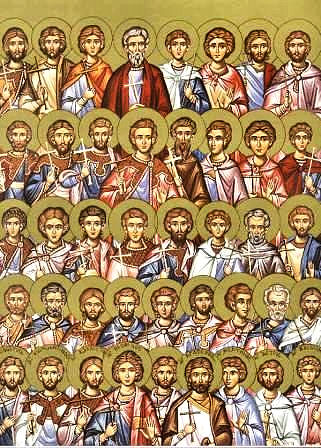Quarante-deux saints martyrs d'Amorium
Au milieu du IXème siècle, le
calife de Bagdad avait remporté la victoire contre les Byzantins et, après la
prise de la ville d'Amorium en Haute Phrygie, il fit passer les habitants au
fil de l'épée ne gardant prisonniers que quarante-deux officiers dans des
conditions particulièrement insupportables. A leurs gardiens qui leur
demandaient d'abjurer la foi chrétienne pour être libérés, ils répondirent
"Que feriez-vous si vous étiez à notre place?" -"Nous changerions
de religion, car il n'y a rien de plus cher que la liberté." Pendant sept
ans, ils préférèrent la prison pour le Christ, à l'apostasie pour la liberté.
Puis, ils furent condamnés à l'exécution capitale en 845. Sur les rives de
l'Euphrate devant une foule venue assister à leur exécution, ils s'avancèrent
un à un et, sans crainte ni hésitation, présentèrent leur tête au bourreau.
Saints Martyrs d'Amorium
42 personnes (✝ 845)
Le calife de Bagdad avait remporté la victoire contre les Byzantins et,
après la prise de la ville d'Amorium en Haute Phrygie, il fit passer les
habitants au fil de l'épée ne gardant prisonniers que quarante-deux officiers
dans des conditions particulièrement infectes. A leurs gardiens qui leur
demandaient d'abjurer la foi chrétienne pour être libérés, ils répondirent
"Que feriez-vous si vous étiez à notre place?" -"Nous
changerions de religion, car il n'y a rien de plus cher que la liberté."
Pendant sept ans, ils préférèrent la prison pour le Christ, à l'apostasie pour
la liberté. Puis, ils furent condamnés à l'exécution capitale. Sur les rives de
l'Euphrate devant une foule venue assister à leur exécution, ils s'avancèrent
un à un, et sans crainte ni hésitation, ils présentèrent leur tête au bourreau.
En Syrie, l’an 848, la passion de quarante-deux saints martyrs, qui furent
saisis par les Sarrasins à Amorium de Phrygie, conduits jusqu’à l’Euphrate et,
puisqu’ils refusaient de renier la foi chrétienne, égorgés par l’épée.
Martyrologe romain
42 Martyrs of Ammoria in Phrygia
The Holy 42 Martyrs of Ammoria: Constantine, Aetius (Aetitus), Theophilus, Theodore,
Melissenus, Callistus, Basoes and the others with them. During a war between
the Byzantine Emperor Theophilus (829-842) and the Saracens, the Saracens
managed to besiege the city of Ammoria (in Galicia in Asia Minor). As a result
of treason on the part of the military commander Baditses, Ammoria fell, and
forty-two of its generals were taken captive and sent off to Syria.
During the seven years of their imprisonment they tried in vain to persuade
the captives to renounce Christianity and accept Islam. The captives stubbornly
resisted all their seductive offers and bravely held out against terrible
threats. After many torments that failed to break the spirit of the Christian
soldiers, they condemned them to death, hoping to shake the determination of
the saints before executing them. The martyrs remained steadfast, saying that
the Old Testament Prophets bore witness to Christ, while Mohammed called
himself a prophet without any other witnesses to support his claim.
They said to the soldier Theodore, “We know that you forsook the priestly
office, became a soldier and shed blood in battle. You can have no hope in
Christ, Whom you abandoned voluntarily, so accept Mohammed.” But the martyr
replied, “You do not speak truthfully when you say that I abandoned Christ.
Moreover, I left the priesthood because of my own unworthiness. Therefore, I
must shed my blood for the sake of Christ, so that He might forgive the sins
that I have committed against Him.”
The executioners took each one separately and led him off to be beheaded,
then threw the bodies into the River Euphrates. In the service to them, these
holy passion-bearers are glorified as: the “All-Blessed” Theodore, the
“Unconquered” Callistus, the “Valliant” Constantine, the “Wondrous” Theophilus
and “the Most Strong” Basoes.
The betrayer Baditses did not escape his shameful fate. The enemy knew that
it is impossible to trust a traitor, and so they killed him.
